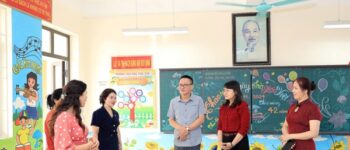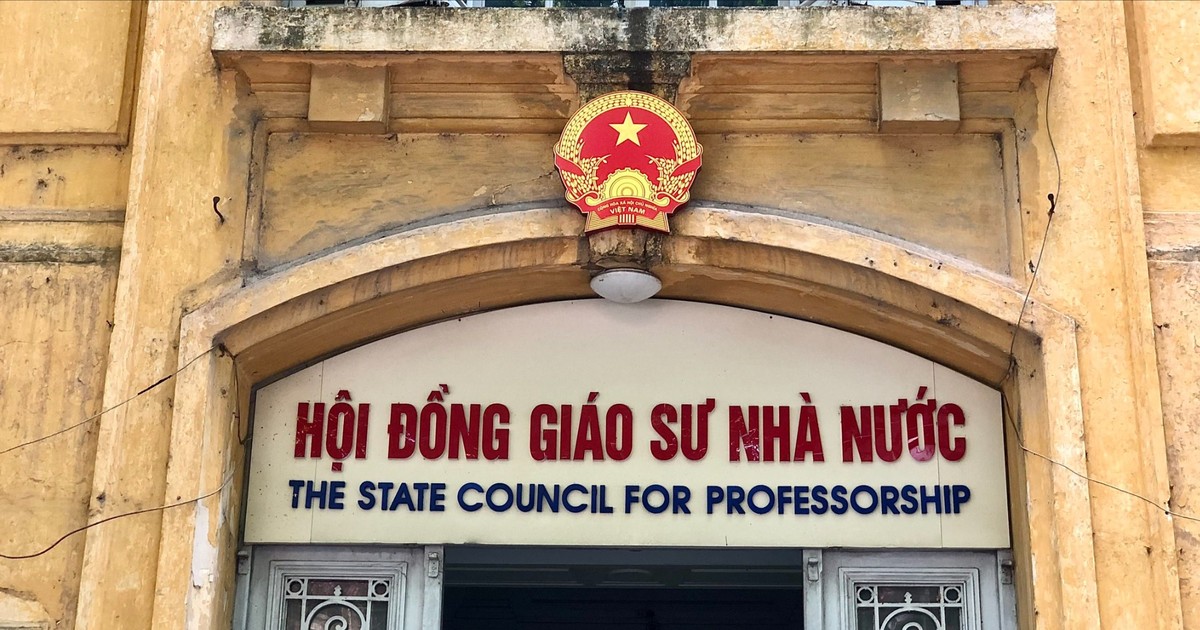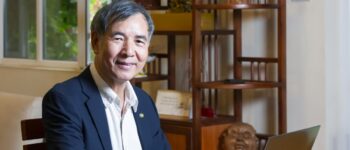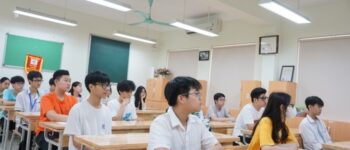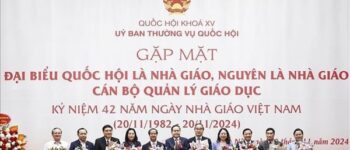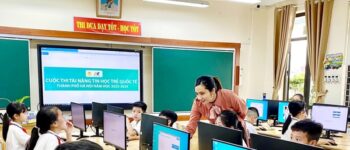Promoting international integration in education and training to meet the requirements of improving the quality of human resources to serve national development in the new period is an important task in Conclusion No. 91-KL/TW of the Ministry. Politics on implementing fundamental and comprehensive innovation in education and training.
- Huyện Đan Phượng biểu dương, tôn vinh các điển hình tiên tiến, nhà giáo tiêu biểu
- Đặt hàng đào tạo: Cần có quy định rõ ràng về trách nhiệm của các bên tham gia
- Thuê nhà dân 200 nghìn/ca, nhiều GV trường công tha hồ dạy học sinh chính khóa
- Bộ GDĐT có công điện về việc chủ động ứng phó với bão số 4
- GV đánh giá đề tham khảo Ngữ văn dẹp học “tủ”, đề Sử có “thách” nhưng không “đố”
Internationalization of education is an opportunity to improve the way education programs operate
Bạn đang xem: Đề xuất Nhà nước có chính sách ưu tiên về thủ tục visa cho sinh viên quốc tế
Talking to reporters from Vietnam Education Electronic Magazine, Associate Professor, Dr. Mai Thanh Phong, Principal of Polytechnic University, Ho Chi Minh National University assessed: “Internationalization in higher education Education is an urgent, important, and strategic task for the development of Vietnam's higher education in particular and improving the quality of the country's human resources in general. This is both an innovation opportunity and a challenge for today's higher education institutions.
In the context of integration, we have many valuable opportunities to take advantage of the globalization trend, absorb and receive new intellectual achievements and the fruits of outstanding scientific and technological advances.
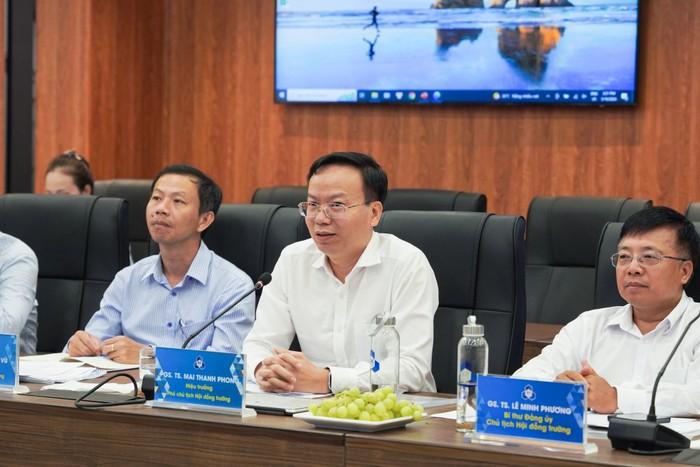
Associate Professor, Dr. Mai Thanh Phong, Rector of Polytechnic University, Ho Chi Minh National University (Photo: NVCC)
Furthermore, Vietnam is located in a dynamic and developed economic region, the need for high-quality human resources is increasing. Along with that, universities also benefit from timely guidelines and policies on training of the Party and State.”
Associate Professor, Dr. Mai Thanh Phong shared that, since the early 90s, school leaders over time have been clearly aware of opportunities and challenges, early building cooperative and collaborative programs. training with reputable international partners around the world, notably partners such as the University of Tasmania (Australia), developing partnerships with the US, Japan, Switzerland…
“To date, we are operating 15 majors under the International Transfer program, 23 majors under credit recognition cooperation with prestigious universities, among the top 1% in the world. Students enrolled in these programs will study the first 2-2.5 years at Ho Chi Minh University of Science and Technology, Ho Chi Minh National University, and the next 2-2.5 years will transfer to partner schools to complete the program. study program and receive a university degree from the partner.
Therefore, students will experience studying at two leading schools in Vietnam and abroad, they will have many opportunities to explore and develop themselves, thereby improving their capacity and becoming outstanding global citizens.
Furthermore, through cooperation with reputable partners, the school also learns a lot of experience in operating educational programs from other schools and other countries, thereby improving the school's processes and management methods. school, aiming to provide the best quality services for learners. Besides, joint training cooperation also opens up many opportunities for us in student exchange, lecturer exchange, research cooperation, sponsoring student activities…” – Associate Professor, This doctor said.
Develop a foreign language learning program to solve the problem of attracting international students
However, Associate Professor, Dr. Mai Thanh Phong also assessed that: “To achieve the above results and opportunities, the school encountered many difficulties.
First, the educational institutions of the parties take a long time to agree and sign cooperation due to differences in laws, regulations, and legal procedures between countries.
Second, due to the host country's security regulations for partner universities, it is difficult for the school to monitor students' phase 2 learning outcomes – the period after transferring to a partner university. Therefore, it is difficult for schools to evaluate the effectiveness and impact of joint training programs.
Xem thêm : Hải Phòng: Rèn kỹ năng ứng phó với căng thẳng và áp lực cho học sinh
Third, in terms of admission, we must focus more on the consultation stage before candidates submit their applications, because in phase 2, students will accept many differences, learning environments, culture, language, living style, career opportunities after graduation… These are some of the difficulties that the school is trying to share with the students.”
Assessing whether training programs in foreign languages should be built to attract international students, Associate Professor, Dr. Cao Dinh Kien, Head of International Cooperation Department, Foreign Trade University said: “It is completely feasible and necessary for Vietnamese higher education institutions to develop training programs in foreign languages to attract international students. Especially in the context of popularizing English as increasingly important as it is today. However, to be able to deploy training programs in foreign languages, Vietnamese higher education institutions need to pay attention to quality assurance conditions, especially the quality of the teaching staff. teaching in foreign languages.

Associate Professor, Dr. Cao Dinh Kien, Head of International Cooperation Department, Foreign Trade University (Photo: NVCC)
At Foreign Trade University, about 60% of the training programs being implemented are programs taught in foreign languages. Over 50% of the entire school's students are studying in these programs.
Foreign Trade University has been assigned the task of implementing 2 advanced programs (including Foreign Economics and International Business Administration) among 35 advanced programs in the country from 2008 and 2010, accordingly, The basic program is built according to the US partner's program and students have the opportunity to receive 02 university degrees from Foreign Trade University and the partner.
Up to now, the school has developed one more advanced program in finance and banking in cooperation with Swiss partners and most recently the advanced i-Hons program in cooperation with the University of Queensland, a school in the TOP 40 of the world. gender (according to QS rankings)”.
Sharing more about international links at the facility, Associate Professor, Dr. Mai Thanh Phong added: “Ho Chi Minh National University of Science and Technology has implemented many scholarship programs for students. students in general and students participating in English training programs in particular. These scholarships come from the school's scholarships or from organizations and businesses Launching international student support programs such as support and advice on visa application, residence application, advice on culture, language and other diverse needs of students.
Currently, the school has also opened many training programs in English and foreign languages. Previously, the school only had a few international programs but taught in Vietnamese. Currently, all of the school's faculties have programs taught in English.
Give universities autonomy so they can be more proactive in their operations
Talking to reporters, Associate Professor, Dr. Nguyen Huu Hieu, Rector of Polytechnic University, University of Danang proposed: “Currently, accepting foreign students to study in Vietnam faces a challenge. There are some difficulties in visa procedures, taking a long time to complete the procedures.

Associate Professor, Dr. Nguyen Huu Hieu, Rector of Polytechnic University, University of Danang (Photo: NVCC)
Therefore, I propose that the State have a priority policy on visa procedures for international students, not only students from countries in Southeast Asia.
At the Conference on September 26, 2024 in Hai Phong, the Ministry of Education and Training organized a conference on investment cooperation with foreign countries in education in 2024. Deputy Minister Nguyen Van Phuc emphasized three strategic priorities in Attracting foreign cooperation and investment in Vietnamese education, including “attracting prestigious foreign universities to establish branches in Vietnam.
Xem thêm : Trường đại học phải công khai phương thức xét tuyển
Therefore, it is necessary to speed up the process of developing effective legal policies to attract universities to establish branches in Vietnam. The location of branches in Vietnam is not only in big cities but also in cities with convenient traffic locations and potential cities like Da Nang.”
Regarding this issue, Associate Professor, Dr. Cao Dinh Kien further shared: “In order to attract international students to study and research, Foreign Trade University focuses on synchronously deploying solutions.” such as: continuously improving the curriculum in accordance with world training trends to increase international recognition of domestic training programs, updating modern teaching and assessment methods to suit consistent with the output standards of the training program, strengthening quality assurance conditions, with special emphasis on lecturer quality. In addition, the school also diversifies extracurricular activities for international students; Complete the coordination mechanism to support international students…
Attracting international students to study is one of the top tasks to internationalize the educational environment in Vietnam. In the coming time, I would like to highlight 3 special contents that need attention to attract international students including: open and flexible international learning environment, job opportunities for international students and programs Training is highly integrated.
Higher education institutions need to build a multicultural learning environment and facilities that meet international standards in Vietnam. Campus, dormitory, library, classroom, laboratory… must meet common standards in learning and research. This is a prerequisite for international students to feel comfortable studying and living in Vietnam.
Furthermore, cultural, social, and sports activities also need to be designed appropriately, aiming to enhance interaction and connection between international students and Vietnamese students.”
Associate Professor, Dr. Mai Thanh Phong added that the school also strengthens the school's image recognition with domestic and foreign partners, the business community and society. The school continuously updates training information, science and technology and other diverse information on many mass media and popular social networking platforms in both Vietnamese and English, creating favorable conditions for for learners and interested parties to have more complete and rich information about the school.
“We understand that the process of internationalizing training and joint training always has difficulties and challenges, from investment costs to infrastructure, staff and policies.
From the difficulties and challenges mentioned above, I would like to make some suggestions as follows:
Firstly, we should give more autonomy, autonomy associated with high accountability, to educational and training institutions in the internationalization of education so that the institutions can have more self-determination and be more proactive in their activities. its activities.
Second, on the basis of limited general investment resources, the State needs to focus on key investments in internationalizing education in priority fields, according to current strengths.
Third, it is necessary to pay attention to removing some difficulties and obstacles in regulations on work permits for foreigners for international experts in specific professional fields and educational experts.
Fourth, build mechanisms and legal bases so that localities can support universities. It can be seen that Ho Chi Minh City is an area with many prestigious public universities under the central government, but the city's support mechanism for these units is still difficult because they are not city universities.
Currently, the People's Committee of Ho Chi Minh City is implementing a project to build Ho Chi Minh City into an international center of education and training that attracts students from the region and the world. Polytechnic University, Ho Chi Minh National University is also a member of this project team and currently we are jointly analyzing, evaluating options and proposing action plans to attract students. foreign students come to Ho Chi Minh City to study and experience” – Associate Professor, Dr. Mai Thanh Phong shared.
Quynh Nguyen
https://giaoduc.net.vn/de-xuat-nha-nuoc-co-chinh-sach-uu-tien-ve-thu-tuc-visa-cho-sinh-vien-quoc-te-post246639.gd
Nguồn: https://dut.edu.vn
Danh mục: Giáo Dục
